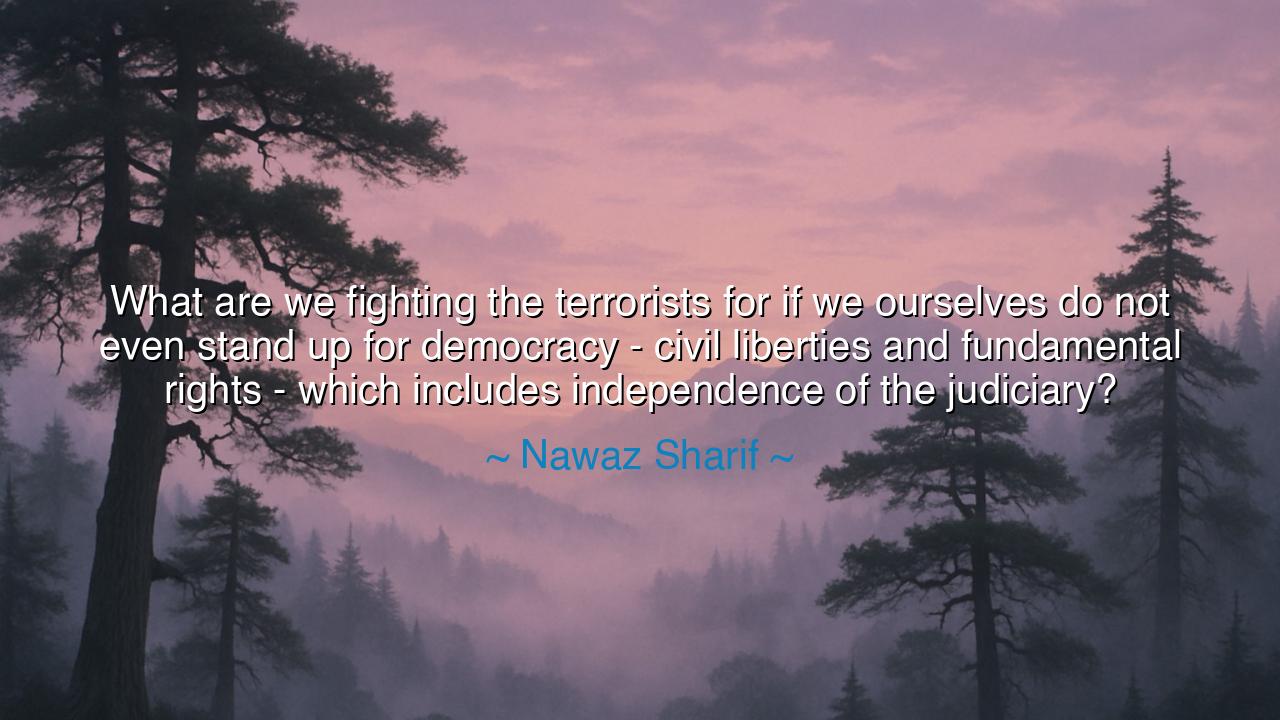
What are we fighting the terrorists for if we ourselves do not
What are we fighting the terrorists for if we ourselves do not even stand up for democracy - civil liberties and fundamental rights - which includes independence of the judiciary?






“What are we fighting the terrorists for if we ourselves do not even stand up for democracy — civil liberties and fundamental rights — which includes independence of the judiciary?” — Nawaz Sharif
In these solemn words, Nawaz Sharif, former Prime Minister of Pakistan, speaks not as a politician defending a policy, but as a man confronting the soul of his nation. His question pierces like an arrow through the fog of hypocrisy that so often clouds the struggles of modern states. He asks, with moral clarity, how a people can claim to fight terrorism — that is, the destruction of freedom by violence — if they themselves erode the very freedoms they claim to defend. His call is a warning that no nation can defeat darkness with darkness, nor preserve liberty by abandoning its democracy, its civil liberties, and the independence of the judiciary — the very pillars upon which justice and civilization rest.
The meaning of this quote runs deep, for it speaks to a truth that transcends borders and centuries. Every society, when faced with fear — whether from enemies without or within — is tempted to surrender its principles for the illusion of safety. In times of terror, governments may silence dissent, restrict speech, or weaken courts in the name of national security. But Sharif reminds us that to do so is to lose the moral war, even if one wins the military battle. For a nation that sacrifices its conscience for control ceases to be free — it becomes the very thing it claims to resist. Thus, the struggle for freedom is not only against enemies with guns and bombs, but also against the slow decay of integrity within.
The origin of these words lies in a moment of great turmoil in Pakistan’s history. In the mid-2000s, after years of military rule and political upheaval, the country stood at a crossroads. The judiciary had been dismissed and the constitution violated under the pretext of maintaining order. In response, lawyers, judges, and citizens took to the streets in what became known as the Lawyers’ Movement, demanding the restoration of judicial independence. It was during this time that Sharif, long exiled and then returned, became a voice for those who believed that true strength lies not in repression but in justice. His words were a rebuke not only to tyrants and extremists, but to the complacent — to all who believed that liberty could wait until after peace was secured. For Sharif saw what the ancients had known: that peace without justice is but another form of tyranny.
To understand this wisdom, one might look to the annals of history. When Socrates was condemned by the city of Athens in a moment of fear and moral confusion, the philosopher accepted his death but not the corruption of justice. Athens, in silencing its conscience, wounded itself far more deeply than any enemy could. So too, when the Roman Republic, beset by enemies, surrendered its democratic institutions for the promise of security under Caesar, it lost not only its freedom but its very soul. Sharif’s words stand in this same tradition — the eternal warning that civilizations perish not from invasion, but from the betrayal of their own ideals.
It is easy, in the comfort of stability, to praise democracy and civil liberties; but it is only in the crucible of crisis that their worth is truly tested. When bombs fall and fear spreads, it is then that the heart of a nation is revealed. Will it hold fast to the rule of law, or will it abandon it in the name of vengeance? Will it protect the weak and innocent, or will it silence them for convenience? The test of freedom, Sharif tells us, is not when times are easy, but when they are perilous. To fight terrorism, one must defend not only life, but the principles that make life worth living.
And yet, Sharif’s plea is not one of despair, but of hope — hope that the people can awaken to their responsibility. For the independence of the judiciary is more than a matter of courts and judges; it is the beating heart of every free society. Without it, there can be no justice; without justice, no peace; without peace, no liberty. It is the safeguard against tyranny, the shield that protects the citizen from both the despot and the mob. When he calls for its defense, Sharif is calling for the preservation of the very balance that allows nations to stand upright before history.
Let this be the lesson for all who would hear: do not trade your principles for temporary peace, nor your freedoms for false security. Guard your democracy as you would guard your children, for it is their inheritance. Defend your civil liberties, for they are the measure of your humanity. And above all, preserve the independence of justice, for without it, the mightiest nation becomes a wilderness of power without conscience. When fear comes — as it always does — stand firm in truth, for truth is the only weapon that tyranny cannot wield.
And so, as Nawaz Sharif’s words echo through time, they remind us that the greatest victory over terror is not found in force of arms, but in fidelity to principle. The nation that keeps its conscience, even when threatened, will never fall. For as long as men stand for justice, the flame of freedom cannot be extinguished — it will burn, steady and eternal, lighting the way for generations yet unborn.






AAdministratorAdministrator
Welcome, honored guests. Please leave a comment, we will respond soon